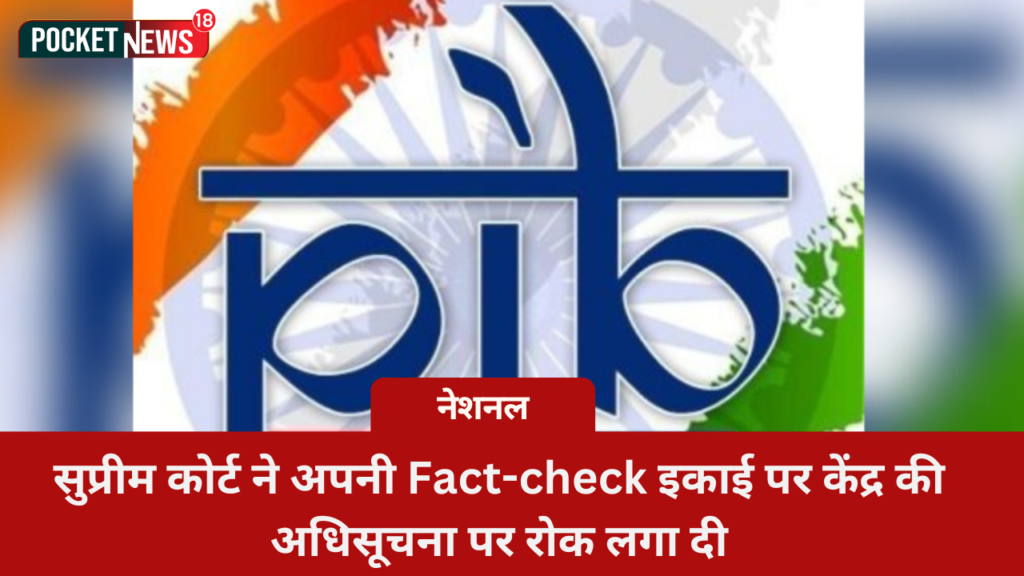
केंद्र द्वारा “फर्जी समाचार की चुनौती से निपटने के लिए” प्रेस सूचना ब्यूरो के तहत तथ्य जांच इकाई को अधिसूचित करने के एक दिन बाद, सुप्रीम कोर्ट ने आज अधिसूचना पर रोक लगा दी और सरकार के कदम को बॉम्बे हाई कोर्ट की हरी झंडी को खारिज कर दिया।
भारत के मुख्य न्यायाधीश डीवाई चंद्रचूड़, न्यायमूर्ति जेबी पारदीवाला और न्यायमूर्ति मनोज मिश्रा की पीठ ने कहा कि यह मामला अभिव्यक्ति की स्वतंत्रता से संबंधित है। हालाँकि, अदालत ने कहा कि वह मामले के गुण-दोष पर कोई टिप्पणी नहीं करेगी।
स्टैंड-अप कॉमेडियन कुणाल कामरा और एडिटर्स गिल्ड ऑफ इंडिया ने बॉम्बे हाई कोर्ट का दरवाजा खटखटाया था, जिसमें केंद्र को फैक्ट चेक यूनिट को सूचित करने से रोकने का निर्देश देने की मांग की गई थी।
केंद्र ने पिछले साल सूचना प्रौद्योगिकी (मध्यवर्ती दिशानिर्देश और डिजिटल मीडिया आचार संहिता) नियम, 2021 में कुछ संशोधन लाए थे, जिसमें सरकार से संबंधित नकली, गलत या भ्रामक ऑनलाइन सामग्री को चिह्नित करने के लिए एक तथ्य जांच इकाई का प्रावधान भी शामिल था।
नियमों के तहत, यदि इस इकाई को ऐसी कोई पोस्ट मिलती है या उसके बारे में सूचित किया जाता है जो फर्जी, झूठी और सरकार के व्यवसाय के बारे में भ्रामक तथ्य हैं, तो यह उन्हें सोशल मीडिया मध्यस्थों के पास भेज देगी।
एक बार ऐसी पोस्ट को चिह्नित कर दिए जाने के बाद, मध्यस्थ के पास इसे हटाने या अस्वीकरण लगाने का विकल्प होता है। दूसरा विकल्प अपनाने पर, मध्यस्थ कानूनी कार्रवाई का जोखिम उठाता है।
याचिकाकर्ताओं ने सेंसरशिप की चिंता व्यक्त की थी और कहा था कि नए नियम उपयोगकर्ताओं को सोशल मीडिया पर खुद को स्वतंत्र रूप से व्यक्त करने से प्रतिबंधित करेंगे। उन्होंने कहा था कि सोशल मीडिया मध्यस्थ कानूनी परेशानियों से बचने के लिए सरकार की फैक्ट चेक यूनिट द्वारा चिह्नित पोस्ट को आसानी से हटा देंगे।
श्री कामरा ने राजनीतिक व्यंग्यकार के रूप में काम करने के अपने अधिकार का उल्लंघन करने के लिए नए आईटी नियमों को भी चुनौती दी और अगर उनकी सामग्री को फैक्ट चेक यूनिट द्वारा चिह्नित किया गया तो उनकी सोशल मीडिया पहुंच खोने का डर व्यक्त किया। उन्होंने कहा कि नियम सरकार को अपनी नीतियों की आलोचना करने वाली किसी भी सामग्री को चिह्नित करने की अनुमति देंगे।
केंद्र ने जवाब दिया था कि फर्जी खबरों पर नकेल कसने के लिए नियम जनहित में जारी किए गए थे। इसने यह भी कहा था कि तथ्य-जांच सबूतों पर आधारित होगी और ऐसे फैसलों को अदालतों में चुनौती दी जा सकती है।
Supreme Court Puts On Hold Centre’s Notification On Its Fact-Check Unit
A day after the Centre notified the Fact Check Unit under the Press Information Bureau to “address the challenge of fake news”, the Supreme Court today paused the notification, setting aside the Bombay High Court’s go-ahead to the government’s move.
A bench of Chief Justice of India DY Chandrachud, Justice JB Pardiwala and Justice Manoj Misra said the matter concerns freedom of expression. The court, however, said it won’t comment on merits of the case.
Stand-up comic Kunal Kamra and the Editors Guild of India had approached Bombay High Court, seeking a direction to restrain the Centre from notifying the Fact Check Unit.
The Centre last year brought some amendments to the Information Technology (Intermediary Guidelines and Digital Media Ethics Code) Rules, 2021, including a provision for a Fact Check Unit to flag fake, false or misleading online content related to the government.
Under the rules, if this unit comes across or is informed about any posts that are fake, false, and contain misleading facts about the business of the government, it would flag them to social media intermediaries
Once such a post is flagged, the intermediary has the option of taking it down or putting a disclaimer. In taking the second option, the intermediary risks legal action.
The petitioners had expressed concerns of censorship and said the new rules would restrict users from expressing themselves freely on social media. They had said the social media intermediaries would readily remove posts flagged by the government’s Fact Check Unit to avoid legal troubles.
Mr Kamra also challenged the new IT rules for violating his right to work as a political satirist and expressed fear of losing his social media access if his content is flagged by the Fact Check Unit. The rules will allow the government to flag any content critical of its policies, he said.
The Centre had responded that the rules were issued in public interest to crack down on fake news. It had also said the fact-check will be based on evidence and such decisions can be challenged in courts.